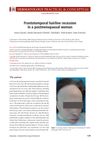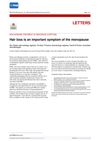 3 citations,
April 2015 in “Dermatology practical & conceptual”
3 citations,
April 2015 in “Dermatology practical & conceptual” Postmenopausal women can experience hairline recession, affecting their quality of life, and more research is needed for treatments.
 1 citations,
January 2018 in “BMJ”
1 citations,
January 2018 in “BMJ” Many women experience significant hair loss during menopause, and topical minoxidil is an effective treatment.
 April 2015 in “Cambridge University Press eBooks”
April 2015 in “Cambridge University Press eBooks” Many women experience sexual dysfunction, but few seek help, and better treatment and medical training are needed.
 195 citations,
May 2003 in “Obstetrics and gynecology (New York. 1953. Online)/Obstetrics and gynecology”
195 citations,
May 2003 in “Obstetrics and gynecology (New York. 1953. Online)/Obstetrics and gynecology” Most women with excess hair growth have an underlying hormonal issue, often treated with medication and hair removal methods.
 135 citations,
August 1994 in “Clinical Endocrinology”
135 citations,
August 1994 in “Clinical Endocrinology” Most women with hirsutism or androgenic alopecia had polycystic ovaries, especially if they had irregular periods.
 63 citations,
March 2011 in “Clinical Endocrinology”
63 citations,
March 2011 in “Clinical Endocrinology” Evaluate postmenopausal women with high androgen levels using medical history, physical exams, lab tests, and imaging to manage health risks.
 5 citations,
May 2019 in “Hormone and Metabolic Research”
5 citations,
May 2019 in “Hormone and Metabolic Research” Women with nonclassic 21-hydroxylase deficiency can have successful pregnancies through IVF, with certain factors affecting their chances.
 December 2020 in “Èffektivnaâ farmakoterapiâ”
December 2020 in “Èffektivnaâ farmakoterapiâ” Selenzin Peptide Active can effectively treat hair loss in postmenopausal women.
 April 2014 in “Journal of evolution of medical and dental sciences”
April 2014 in “Journal of evolution of medical and dental sciences” Women over forty can maintain skin and hair health with lifestyle and dietary changes.

Women with androgenetic alopecia have normal levels of most blood steroids and binding proteins, but higher dehydroepiandrosterone. Some also have low "sex hormone-binding globulin" and "corticosteroide-binding globulin" capacity, and high "free androgen index" and "free cortisol index". Diane treatment can normalize these levels and improve hair conditions.
 286 citations,
January 2009 in “Human Reproduction Update”
286 citations,
January 2009 in “Human Reproduction Update” Women with the NIH type of PCOS have more obesity and higher risk of diabetes and heart disease than those with other types of PCOS.
 36 citations,
November 2009 in “European Radiology”
36 citations,
November 2009 in “European Radiology” The study found that women with PCOS have more and larger ovarian follicles and differences in ovarian structure, but these features alone can't always diagnose PCOS.
 34 citations,
May 2017 in “Seminars in Reproductive Medicine”
34 citations,
May 2017 in “Seminars in Reproductive Medicine” Women with PCOS have a higher risk of diabetes, heart problems, certain cancers, and mental health issues, but early treatment can help manage these risks.
 14 citations,
March 2022 in “Clinical Endocrinology”
14 citations,
March 2022 in “Clinical Endocrinology” The document concludes that a systematic approach is crucial to identify causes of androgen excess in women beyond the most common cause, Polycystic ovary syndrome (PCOS).
 11 citations,
May 2003 in “Obstetrics and gynecology (New York. 1953. Online)/Obstetrics and gynecology”
11 citations,
May 2003 in “Obstetrics and gynecology (New York. 1953. Online)/Obstetrics and gynecology” Hirsutism in women often indicates a hormonal imbalance and can be managed with a combination of hormonal treatments and hair removal methods.
 August 2024 in “Archives of Women s Mental Health”
August 2024 in “Archives of Women s Mental Health” Women with PCOS have more depression and stress due to high androgen levels, not obesity or insulin resistance.
 November 2023 in “International Journal of Women's Dermatology”
November 2023 in “International Journal of Women's Dermatology” Hormone replacement therapy may improve hair growth in the frontal hairline of postmenopausal women with hair loss.
 53 citations,
October 1984 in “Endocrine reviews”
53 citations,
October 1984 in “Endocrine reviews” Excessive hair growth in women often has no known cause and is not linked to race or other hormonal symptoms.
37 citations,
December 2017 in “Journal of Investigative Dermatology Symposium Proceedings” Black and Hispanic women are more likely to have alopecia areata than white women.
11 citations,
July 2019 in “International journal of women’s dermatology” Certain skin conditions in women are linked to higher risks of metabolic syndrome and type 2 diabetes due to hormone imbalances.
 10 citations,
December 2010 in “British Journal of Dermatology”
10 citations,
December 2010 in “British Journal of Dermatology” After menopause, some women lose scalp hair and gain facial hair, with patterns suggesting different underlying causes.
 6 citations,
March 1982 in “Clinical and Experimental Dermatology”
6 citations,
March 1982 in “Clinical and Experimental Dermatology” The document says that hair loss in women is often due to androgenic alopecia, similar to male baldness, and that hirsutism is treated with hormonal and cosmetic methods.
 1 citations,
May 2011 in “Journal of Obstetrics and Gynaecology”
1 citations,
May 2011 in “Journal of Obstetrics and Gynaecology” Hair loss in postmenopausal women due to ovarian hyperthecosis is rare, but removing the ovaries can significantly improve the condition.
 September 2022 in “International Journal of Health Sciences and Research”
September 2022 in “International Journal of Health Sciences and Research” Resistance training improved BMI and menstrual regularity more in women with PCOS than aerobic training.
November 2014 in “PharmaTutor” Finasteride may help postmenopausal women with hair loss but is not effective for all and should be used cautiously in premenopausal women.
 January 2012 in “Yearbook of Dermatology and Dermatologic Surgery”
January 2012 in “Yearbook of Dermatology and Dermatologic Surgery” No significant difference in iron deficiency between women with or without hair loss.
 July 2010 in “British Journal of Dermatology”
July 2010 in “British Journal of Dermatology” Hair loss in women may have multiple causes, and eyebrow regrowth possible with specific injections.
 13 citations,
June 2021 in “Carcinogenesis”
13 citations,
June 2021 in “Carcinogenesis” Certain hair straighteners and dyes may increase ovarian cancer risk, especially in African American/Black women.
 5 citations,
January 2006 in “Journal of obstetrics and gynaecology”
5 citations,
January 2006 in “Journal of obstetrics and gynaecology” Metformin can cause hair loss in some women with PCOS.
 2 citations,
August 2022 in “Reproductive Biology and Endocrinology”
2 citations,
August 2022 in “Reproductive Biology and Endocrinology” Magnesium supplements improved quality of life for women with polycystic ovary syndrome, but didn't help with acne, hair loss, or abnormal bleeding.



























